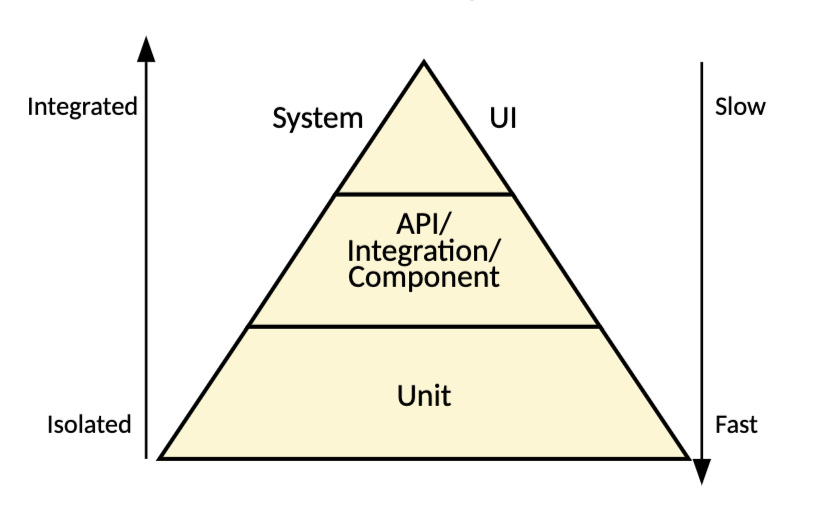before - 02-testing-intro
note: same as 08-unit-testing
test suite design
objectives
- functional correctness
- non-functional attributes
 automated testing pyramid
automated testing pyramid
unit testing
ensure each functionality of each component work in isolation
in practice, debates on
- isolation degree
- big vs small vs unit
advantage - rapid feedback and quick refactoring
dual view
- specify expected behavior
- executable specification
used to guide in TDD
- empirical evidence - rapid feedback important, but TDD not
unit test principles
- focus on isolation
- simple to set up and run
- easy to understand
- maintain like product code
GoogleTest
commonly used framework for c++
TEST(TriangleTest, isEquilateral) {
Triangle tri{2, 2, 2};
EXPECT_TRUE(tri.isEquilateral());
}test cases written as functions
- assert oracles terminate when fail
- expect allow program to conitnue running
some test requires common setUp and tearDown
- grouped into test fixtures
class StackTest : public ::testing::Test {
protected:
void SetUp() override {
}
void TearDown() override {}
}then used in test cases defined with TEST_F
TEST_F(StackTest, ...) {...}- TEST_F specifies tests that use fixtures
- EXPECT_EQ is assertion or oracle we have not seen before
designing unit test
steps
- Arrange - set up scenario
- Act - run the scenario
- Assert - check outcome
design
- common structure
- test run in isolation
common patterns
check state
- final state
- prepare initial state
- run test
- check final state
- pre and post conditions
- check initial and final state
- relative effects
- check final relative to initial
- round trips
- check behavior on transform/ inverse transform pairs
checking interactions/ behaviours
- common to use mocks (fakes)
- mock vs stub = behavioural testing vs state testing
testability
what makes testing hard?
- dependencies
- connections
- singletons
- nondeterminisms
- static binding
key points:
- mocks and stubs to isolate components
- dependency injection to allow use mocks and stubs when necessary
- techniques can lead to boilerplate code
- reduce pain
- frameworks exists to automate
GoogleMock
steps
- derive class wish to fake
- replace virtual calls with uses of MOCK_METHOD
- use fake class in tests
- specify expectations before EXPECT_CALL
- expectations are automatically checked
InSequence dummy;
EXPECT_CALL(mockThing, foo(Ge(20)))
.Times(2)
.WillOnce(Return(100))
.WillOne(Return(200))
EXPECT_CALL(mockThing, ...)